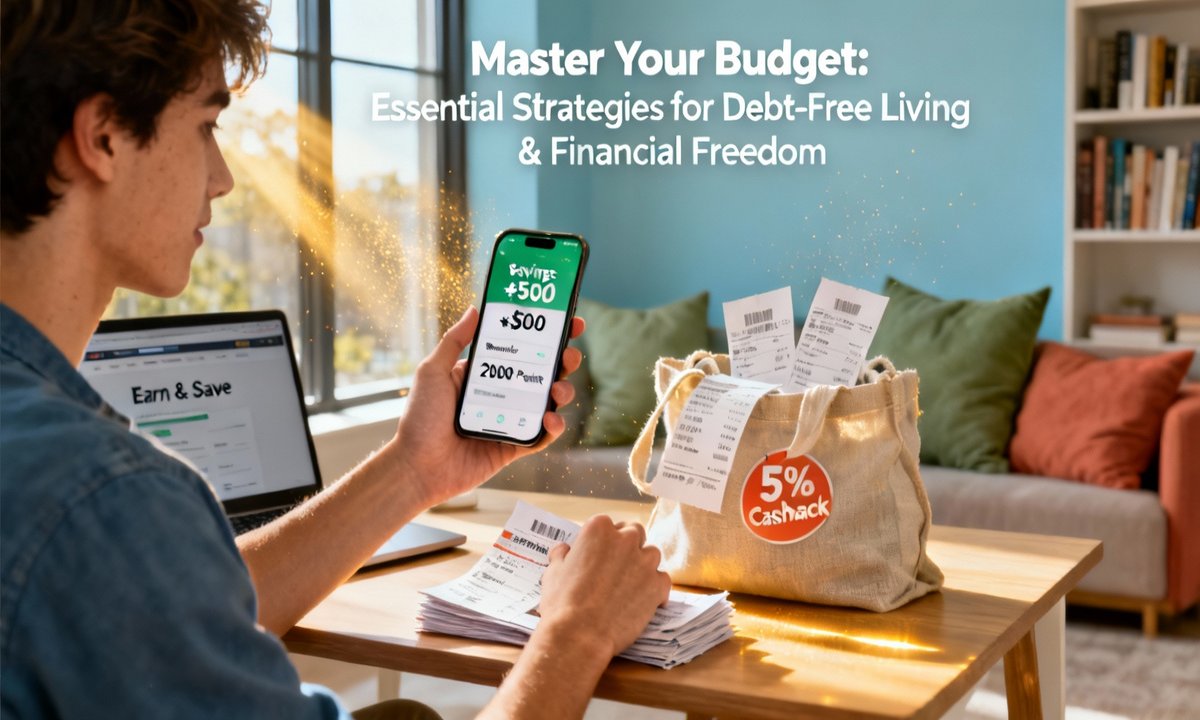Achieving financial freedom involves more than just saving; it requires making informed, confident choices with your money. Mastering budgeting and embracing a debt-free lifestyle can provide long-term stability and peace of mind for U.S. households. Explore actionable steps today to begin your journey toward financial independence.
Navigating Towards Financial Freedom: Your Essential Guide
A well-structured budget offers significant control over your finances, preventing money from controlling you. Whether aiming to reduce stress, prepare for major life events, or boost confidence, effective strategies can profoundly transform your financial outlook. Understanding the U.S. economic landscape is crucial for proactively managing your household finances and planning for the future.
Understanding the U.S. Economic Landscape
Federal budget decisions significantly impact every American household. Grasping how mandatory and discretionary spending influences your taxes, public services, and overall cost of living allows for better forecasting of household expenses. Current policies supporting healthcare affordability, rental assistance, and consumer price stabilization are vital to consider in your personal budget planning. Learn more about the U.S. Government Budget Process.
Proven Budgeting Strategies for Success
Setting and Achieving Your Financial Goals
Begin by clearly defining your financial goals with specific objectives, such as building an emergency fund, planning for retirement, or eliminating debt. Regular check-ins are crucial to ensure you remain on track and can adjust your strategies as your needs evolve. This foundational step provides essential direction for your financial journey.
Monitoring Your Money Effectively
Meticulously record all your income and expenses. Utilizing budgeting applications or worksheets helps identify spending patterns and uncover areas where money might be unintentionally slipping away. Consistent tracking empowers you to prevent overspending and significantly enhance your saving potential.
Crafting a Realistic Monthly Budget
Your budget planner should prioritize non-negotiable expenses first, including rent, groceries, transportation, and insurance. Allocate remaining funds thoughtfully for discretionary spending and dedicated savings. Discover ways to maximize mealtime savings through smart planning. Find useful tips in our guide on Healthy Eating on a Budget: Meal Prep Strategies.
Embracing Automated Financial Habits
Automating transfers to savings accounts and setting up autopay for bills are powerful strategies to maintain your financial plan. This approach effectively prevents late fees and streamlines the saving process, making it feel more effortless. Automated bill pay is a straightforward yet impactful personal finance tip.
Regular Financial Health Check-Ups
Schedule consistent financial reviews, whether monthly or quarterly. Use these sessions to compare your actual spending against your established budget and make any necessary adjustments. This vital habit ensures your financial goals remain a central focus in your money management efforts.
Achieving Debt-Free Living: Your Path to Liberation
Strategizing Your Debt Payoff
Compile a comprehensive list of all your debts, noting minimum payments and interest rates. This clear overview empowers you to select the most effective payoff strategy. Consider the debt avalanche method, which targets high-interest debts first for maximum savings, or the debt snowball method, focusing on smaller debts for motivating quick wins. Both are proven paths to debt-free living. For guidance, consult the Consumer FTC Guide: Get Out of Debt.
Negotiating and Consolidating Debt
Don’t hesitate to contact creditors to negotiate for lower interest rates; many are open to working with you. Explore debt consolidation options if they can reduce your overall interest burden or simplify your monthly payments. However, always exercise caution and avoid incurring new financial obligations that prevent undermining your progress.
Preventing New Debt Accumulation
Disciplined spending is fundamental to maintaining financial strength and preventing new debt. Incorporating small lifestyle adjustments and making mindful purchases can keep your finances robust. Remember, frugality is about smart choices, not deprivation. Discover inspirational ideas in Master Your Money: 10 Frugal Living Hacks.
Boosting Income and Smart Spending Tactics
Expanding Your Earning Potential
Actively seek opportunities to enhance your income, whether through side hustles, acquiring new skills, or confidently negotiating for a raise. Even a modest increase of a few hundred dollars each month can significantly accelerate your debt repayment schedule or boost your savings.
Utilizing Available Assistance Programs
If you qualify for healthcare subsidies, specific tax credits, or mortgage relief, strategically leverage these federal and state programs. Such resources can alleviate financial pressure, allowing you to focus more effectively on your journey towards greater financial independence. Refer to the White House Budget for FY2025 (PDF) for relevant information.
Practicing Mindful Spending and Smart Shopping
Consciously reduce non-essential expenditures and always engage in comparison shopping for significant purchases. Explore effective methods to cut grocery bills and reduce utility expenses through energy-efficient home improvements. Consider upgrades that can Slash Your Electric Bill.
Preparing for Irregular Expenses
Proactively set aside small amounts monthly into dedicated “sinking funds” for irregular yet anticipated costs, such as vehicle maintenance or holiday spending. This strategy effectively prevents unexpected expenses from disrupting your carefully planned budget.
Safeguarding and Sustaining Your Financial Freedom
Establishing Your Emergency Fund
It is crucial to set aside funds equivalent to three to six months of essential living expenses. Keep these savings in an easily accessible account. This vital safety net provides protection against unforeseen circumstances like job loss or medical emergencies.
Investing for Future Growth
Initiate investing early for long-term objectives such as retirement or higher education. The power of compound interest significantly rewards consistent time and discipline. Explore various tax-advantaged retirement accounts, including 401(k)s and IRAs, and diversify your investment portfolio to mitigate potential risks. For more, visit USA.gov Retirement Topics.
Maintaining a Healthy Credit Profile
Regularly check your credit report, ideally annually, which you can do for free. Promptly correct any inaccuracies and diligently protect your identity to ensure a robust financial foundation. A strong credit score is essential for many financial endeavors. Access your free report at AnnualCreditReport.com.
Commitment to Ongoing Financial Education
Remain informed on current financial topics and evolving policies, as this knowledge directly influences your money management choices. Educate yourself on budgeting for future milestones, whether planning for college, purchasing a home, or achieving early retirement.
Inspiring Journeys to Financial Independence
Sarah’s Debt Elimination Triumph
Consider Sarah, a single mother from Ohio, who successfully paid off $35,000 in debt within three years using the snowball method. Through diligent expense tracking, automated payments, and making frugal choices like home meal preparation, she significantly reduced financial stress and increased her savings. Her story demonstrates that consistent effort, not just a large income, leads to success.
James and Tara’s Budgeting Success
James and Tara, a couple of new homeowners, established a consistent monthly budget. They effectively utilized sinking funds for holiday expenses and prioritized energy savings within their home. Achieving small victories, such as securing supermarket deals and reducing utility costs, allowed them to transition from living paycheck-to-paycheck to saving for their dream vacation. Explore more creative ways to save by visiting Transform Your Space: Budget-Friendly DIY Decor Ideas.
Frequently Asked Questions About Financial Planning
How do I start budgeting with an irregular income?
Begin by basing your budget on your lowest anticipated monthly income. Prioritize essential expenses and create a financial buffer to manage leaner months effectively. This approach ensures stability even with fluctuating earnings.
Can I pay off debt if I can only make minimum payments?
While possible, debt repayment will proceed at a slower pace. Actively seek opportunities to increase your income or reduce other expenses to make larger payments. Even small additional contributions can significantly accelerate your progress over time.
Is debt consolidation a safe option?
Debt consolidation can be beneficial if it results in lower interest rates and simplifies your payment structure. However, always thoroughly review all terms and conditions, and strictly avoid incurring new debt elsewhere to prevent undermining your efforts.
How should I prioritize between savings and debt payments?
Initially, establish a foundational emergency savings fund, aiming for at least $500 to $1,000. Once this is in place, strategically focus on paying down high-interest debt while continuing to gradually build up your full emergency fund and other savings.
Take the Next Step Towards Your Financial Future
Are you ready to take significant control of your financial destiny? Download our complimentary budget worksheet, subscribe for additional personal finance insights, and feel free to submit your questions in the comments section below. For intricate financial situations or personalized guidance, consider consulting a trusted financial professional. Your future self will appreciate this proactive step.
Explore these related articles for further strategies to maximize your money and strengthen your financial habits:
– Master Your Money: 10 Frugal Living Hacks to Save Thousands This Year
– Healthy Eating on a Budget: Meal Prep Strategies
– Smart Grocery Shopping: Unlocking Supermarket Secrets to Cut Food Costs
– Slash Your Electric Bill: Top 7 Smart Home Upgrades for Energy Savings
Further Resources for Financial Empowerment
For additional comprehensive information and support, consider these valuable resources:
– White House Budget for FY2025 (PDF)
– USA.gov: Federal Budget Process
– FTC.gov: How to Get Out of Debt
– Bridgepoint: Budget Planning 2025
Remember, genuine financial progress is born from consistent effort and informed decision-making. Each deliberate step you take brings you closer to achieving the financial freedom and peace of mind you truly deserve.





